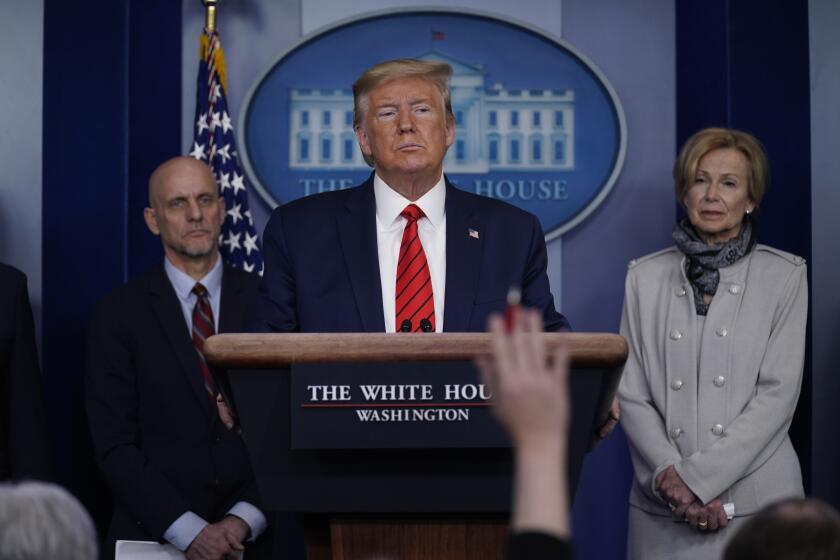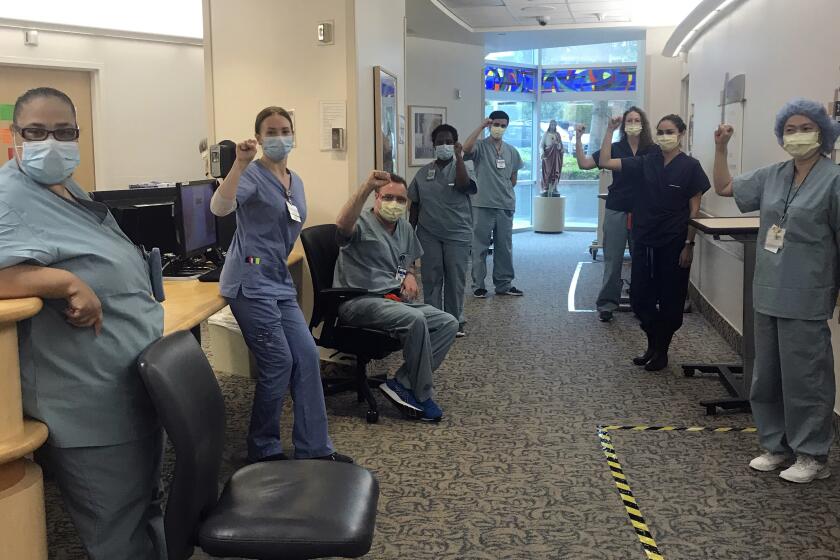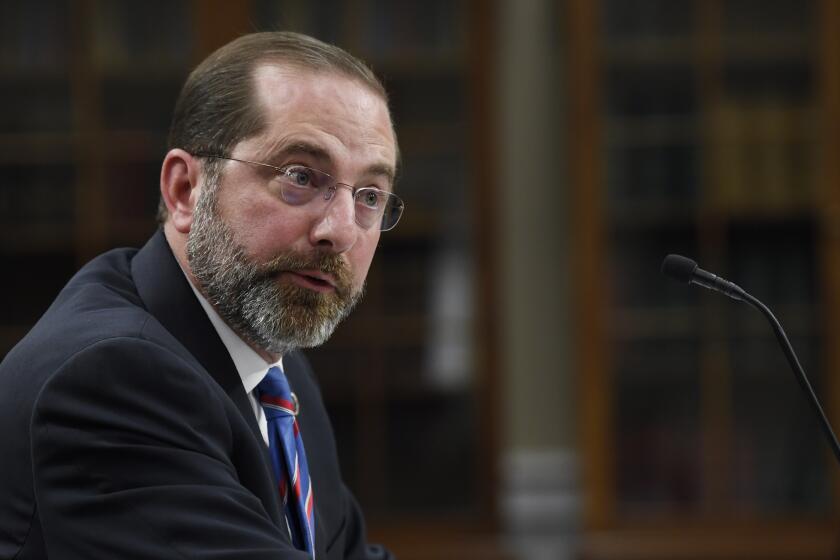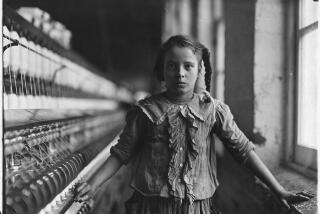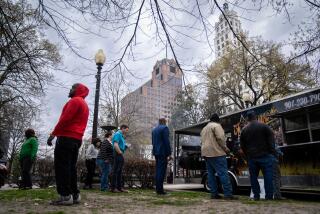Column: States with early reopening orders are coercing workers into risking their lives
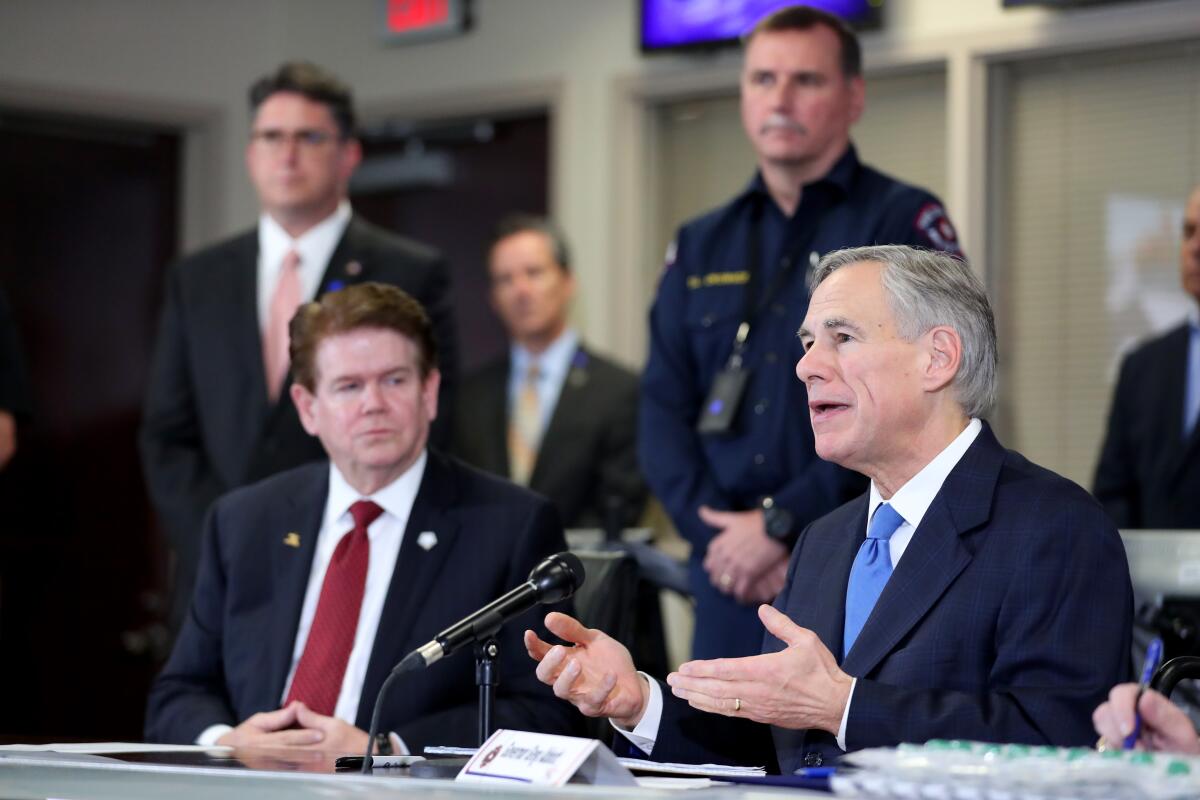
- Share via
Anyone who thought that the COVID-19 crisis would produce lasting respect for low-wage service workers should feel like a chump, as certain states roll out their return-to-work orders.
That’s because the subtext of those orders, such as those issued by the governors of Iowa and Texas, is coercive. Workers who refuse to return to work at businesses that have been cleared to open will lose their unemployment benefits.
In other words, in economic terms they’ll have no choice between losing pay and placing their lives at risk from a coronavirus infection.
Imagine you are a businessman thinking about reopening, and you’ve heard that the trial lawyers all over the country are sharpening their pencils getting ready to sue you.
— Sen. Majority Leader McConnell reveals who he cares about
Iowa’s Republican governor, Kim Reynolds, said last week that failing to return to work in the counties covered by her reopening order, even if they’re staying at home out of fear of catching the virus, would be considered to have done a “voluntary quit,” rendering them ineligible to collect unemployment.
The state’s Workforce Development agency, which oversees the unemployment program, further urged employers to report workers who don’t return to their jobs for a good reason “as soon as possible,” according to the Des Moines Register.
After Texas Gov. Greg Abbott announced a return-to-work policy, that state’s labor authorities also warned that those choosing to stay home would lose their benefits.
A Texas Workforce Commission spokesman told the Texas Tribune that if workers are concerned that their employer is flouting health guidelines, they should contact the U.S. Occupational Safety and Health Administration. Given that U.S. OSHA has been missing in action throughout the crisis, that ranks as a sick joke.
In recent days, alarm about the economic impact of the novel coronavirus have turned conservatives who weeks ago were boasting about the shrinking of the U.S. government into raving Keynesians, proclaiming the virtues of deficit-financed economic stimulus.
Both governors’ orders took effect Friday. Reynolds’ order covered 77 of Iowa’s 99 counties, allowing “restaurants, fitness centers, malls, libraries, race tracks, and certain other retail establishments to reopen in a limited fashion with public health measures in place,” the governor’s office said. Those counties, Reynolds said, have seen a decline in new COVID-19 cases or no new cases at all for two weeks.
The order exempts only workers who are ill with the virus or taking care of an infected family member.
In Texas, Abbott’s order, which also went into effect Friday, covers retail stores, restaurants, movie theaters and malls.
Coupled with the threats of lost unemployment are efforts by Republicans in Congress to immunize business owners from liability for exposing their workers to infection. Senate Majority Leader Mitch McConnell, R-Ky., has drawn a line in the sand against enacting another coronavirus stimulus bill without legal protection for business owners.
“Imagine you are a businessman thinking about reopening, and you’ve heard that the trial lawyers all over the country are sharpening their pencils getting ready to sue you, claiming that you didn’t engage in proper distancing or other issues related to health and safety,” McConnell told Fox News, as the Hill reported.
These efforts together have the effect of placing the onus of reopening the American economy on the shoulders of employees, typically low-wage workers with few options other than to deal with customers face-to-face in service establishments or work in industrial plants shoulder-to-shoulder with fellow employees.
It’s no accident that hot spots of COVID-19 infections are such facilities as slaughterhouses in states with relatively few infections outside those facilities.
Nor should we overlook that medical experts are heavily opposed to premature reopenings in Iowa, Texas or other states, citing the likelihood that they will lead to a recrudescence in COVID-19 cases.
Nurses know how unprepared we were for COVID-19. They’re getting punished for speaking out.
Laws that would block legal recourse for workers infected on the job would raise the risks for all workers by removing an incentive for business owners to comply with safe workplace practices, such as providing employees with protective garb and enforcing personal separation.
The governors’ return-to-work policies also present a quandary for many small businesses that can’t afford to reopen under the rules. Texas, for example, will allow restaurants to reopen only at 25% of their prior occupancy capacity.
That prompted Brooks Anderson, the owner of four Dallas restaurants, to observe, “I think we might lose money faster at 25% revenue than just staying closed for the meantime.”
The governors’ threats to cancel unemployment benefits underscore how unemployment insurance has been used as a cudgel against workers in the past. The best example is Florida. Former Gov. Rick Scott, a Republican now serving in the U.S. Senate, cut back the state’s already miserly benefits even further.
Scott cut the maximum weeks of unemployment benefits to 12 from 26 and mandated that enrollees meet with at least five possible employers per week to keep benefits. He canceled the options to apply for benefits by phone or in person, relegating applicants to a website that regularly crashed (and still does). Employers were given more latitude to claim that workers had been fired for cause rather than laid off.
By limiting sick leave and free healthcare, the U.S. system will promote the spread of coronavirus.
As New York Magazine reported, all these changes reduced the state’s average unemployment assessment for employers to the lowest level in the country -- but overwhelmed Florida‘s application process when unemployment claims soared in the coronavirus emergency.
The prevailing notion among conservatives that people on unemployment are essentially layabouts and malingerers in disguise hampered efforts to use the system to encourage workers to stay home and to cover their lost paychecks in order to block the virus’ spread.
Congressional Republicans such as Sen. Lindsey Graham (R-S.C.) tried to block an increase in benefits on the grounds that the change would make it more lucrative for workers not to work -- never mind that workplaces were shutting down by the thousands, and that the explicit goal of increasing benefits was to keep workers safe at home.
As we’ve reported before, American workers were unusually vulnerable to the economic impact of the virus because of America’s history of anti-worker policies. A huge proportion of workers don’t receive sick pay, and for a larger proportion health coverage is tied to employment, and disappears when the work disappears.
Early in the lockdown period, Americans prided themselves on honoring front-line workers serving us in dangerous circumstances. That feeling already has faded in several statehouses around the country. The prospects are great that when the current crisis passes, it will disappear altogether.
More to Read
Inside the business of entertainment
The Wide Shot brings you news, analysis and insights on everything from streaming wars to production — and what it all means for the future.
You may occasionally receive promotional content from the Los Angeles Times.

